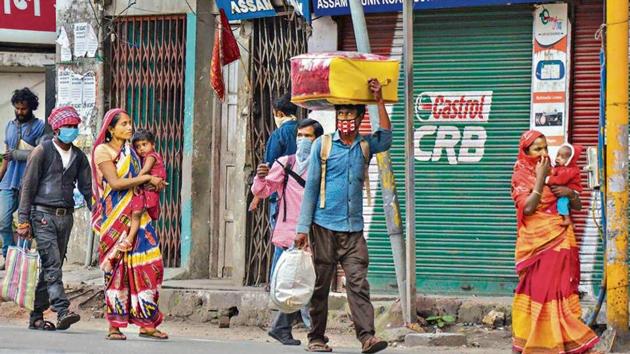Consider enacting 1 nation, 1 ration card: SC to Centre
A three-judge bench headed by justice NV Ramana passed the order in a plea by a petitioner who highlighted the plight of migrant labourers because they did not have local identity proof.
The Supreme Court on Monday asked the Central government to examine the feasibility of implementing the “one nation one ration card” scheme during the national lockdown so as to alleviate the hardships faced by migrant labourers who have been stranded in other states.

A three-judge bench headed by justice NV Ramana passed the order in a plea by a petitioner who highlighted the plight of migrant labourers because they did not have local identity proof.
“…we direct the Union of India to consider whether it is feasible for it to implement the said scheme at this stage or not and take appropriate decision in this regard keeping in view the present circumstances”, the court said disposing of the plea.
The “one nation one ration card” scheme, formulated by the Central government was expected to be launched in June across 20 states. The scheme is aimed at ensuring beneficiaries get what is due to them in terms of subsidised foodgrain even when they are out of their home states.
Experts are not convinced the scheme will work.
“To serve ration card holders who are not usually buying from a PDS (public distribution system) outlet, is a major reform to the supply chain management of the PDS,” said Reetika Khera. “And this rejigging, supplying grain for Bihari men in Tamil Nadu or Gujarat, will have to be done across states. Even if it were possible to do it, most migrants who are stuck in the cities are likely to have left their ration card back home, for their families to use in the village. They will be better served by setting up community kitchens.”
“The most obvious solution is temporarily universalising the PDS. There is enough grain to universalise for a year.”
The petitioner pointed out that many migrant workers who left their home state to work in other cities have been confined to their rented accommodation and are unable to return to their home states because of the lockdown. Millions of migrant workers ar stuck in relief camps and other sites in states other than their own, with no way of returning home.
They have run out of food and with no local identity proof such as a ration card or voter card to avail of government benefits like subsidised food grains, they are facing poverty and hunger, the petition said.
“States and Union Territories have been giving preferences to their respective citizens and voters and denying benefits of subsidised grains, shelter, medical facilities to said migrants labourers/ employees of other states due to absence of local identity proof i.e. ration card/residential proof/ voter card”, the petitioner claimed.
The petitioner, therefore, prayed that the “one nation one ration card” scheme, which is proposed to come into effect from June 2020, should be implemented during the lockdown enforced to contain the pandemic so that migrant labourers are not denied subsidised food grains and other government benefits.
Activist Nikhil Dey said there are many limitations to extending the “one nation, one ration card” even temporarily., pointing out that even within states portability of cards (from one district to another) is not easy.
“The ration cards of migrant labourers are not with them. Different schemes and coverage exists in different states, so they are reluctant to recognise migrants as being entitled to their schemes. In most cases, only one family member has a ration card. Moreover, there are 35% people who are outside the ambit of this scheme and then we have to factor in the population increase since the 2011 census in which NFSA (National Food Secuity Act) coverage is based . It would be one thing if ‘universal ration’ is provided -that is, a person can avail ration using any form of identification like an Aadhaar number , or any other card. That is what the Supreme Court ordered in the Swaraj Abhiyan judgement, for circumstances of a drought , and what it should order in a pandemic and a disaster such as this one -- w e need use our overflowing food stocks to universalize the PDS to deal with hunger. ”






